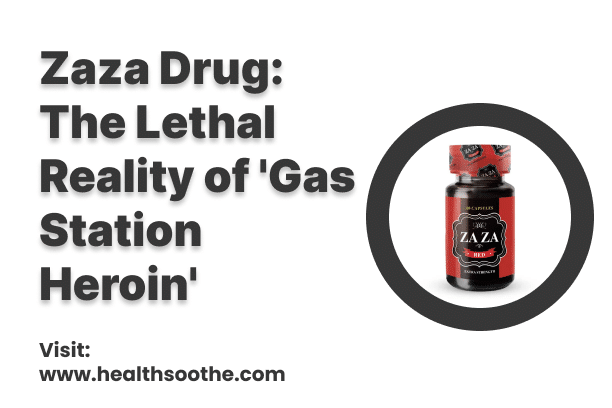Zaza Red, initially developed as an antidepressant, earned the moniker "gas station heroin zaza" due to its opioid-like euphoric effects when consumed in higher doses. Tianeptine is the active ingredient in Zaza Red.
In 2019, an Alabama toxicologist [1] encountered a surge of patients in the emergency room grappling with withdrawal symptoms from a substance colloquially referred to as "gas station dope." This mysterious substance led to severe withdrawal symptoms, often requiring ICU admission.
At that time, Zaza Red, the culprit behind these symptoms, was not well-understood. Seeking insights, the toxicologist turned to Reddit, where user accounts revealed that individuals used the zaza drug as a means to "feel okay," serving as a substitute for prescribed antidepressants and anti-anxiety medications.
Further investigation by the toxicologist uncovered a published review detailing the drug's adverse effects. Subsequently, Alabama enacted legislation to remove Zaza Red from shelves, drawing national attention to this emerging drug trend.
Between 2014 and 2019, the use of the Zaza drug skyrocketed by a factor of "24-fold." Those seeking relief from depressive symptoms turned to this drug, readily available for purchase at gas stations, marking a troubling trend in the proliferation of hazardous substances. Additionally, Zaza Red can be purchased online and in various local convenience stores.
What Is Tianeptine?
Tianeptine, an antidepressant with a unique mechanism of action targeting atypical brain centers, has found application in medical contexts beyond depression, including the treatment of asthma and irritable bowel syndrome. When Tianeptine enters the brain, it binds to opioid receptors, augmenting the absorption of serotonin while concurrently maintaining dopamine availability. This dual action results in an elevation of mood and alleviation of depressive symptoms. However, the drug's impact on the brain's reward system renders it addictive.
In certain regions of Europe, Asia, and South America, Tianeptine is prescribed but subject to close monitoring. Contrastingly, in the United States, the FDA has not granted approval for Tianeptine due to its addictive nature. Notably, this substance has found its way into pills marketed as weight loss medications under the name Zaza Red.
What Is Zaza?
Zaza, categorized as a tricyclic antidepressant, induces sedative effects. Comprising tianeptine, this substance goes by various street names such as Zaza Red, Tianna, Tianna Red, and Tianna White. Marketed as weight loss pills, doses of tianeptine are available over the counter across the United States. Users have reported enhanced cognitive function and an overall sense of well-being as effects of the drug.
What Does Zaza Look Like And Where Can It Be Bought?
The Zaza pills are encapsulated in small red and white capsules, readily accessible online, at gas stations, and in convenience stores. The drug is formulated with a relatively low dose of Tianeptine, typically ranging between 25-30mg. Despite this, users frequently ingest the substance in significantly larger amounts to experience the euphoric effects associated with Zaza Red.
Addiction to Tianeptine
The FDA's apprehension regarding the addictive nature of Tianeptine is justified, given the drug's mechanism of action on opioid receptors and dopamine. This interaction raises the likelihood of addiction, as the body develops a craving for the drug in its absence and associates it with pleasurable sensations. Consequently, Tianeptine carries a significant potential for abuse. Beyond its proven addictiveness, there is also a concern that it could serve as a gateway to other forms of opioid abuse.
Research indicates a higher prevalence of Tianeptine use among males compared to females. Prolonged and consistent use of the drug can lead to withdrawal symptoms upon cessation. The addictive qualities of Tianeptine pose a substantial risk and underscore the importance of careful consideration and monitoring in its use.
Read Also: Lupin Rheza 20 MG Tablet: Uses, Dosage, Side Effects, Price
Pros and Cons of Zaza Drug
Pros
- Short-Term Euphoria
- Potential Cognitive Benefits
- Availability
Cons
- Addiction Risk
- Withdrawal Symptoms
- Gateway to Opioid Abuse
- Health Risks
Differences Between Zaza Drug and Dramamine
Zaza Drug
It is often associated with recreational use and has gained attention for its potential mood-altering effects, but it is not a medically approved or recognized treatment for any specific condition.
Dramamine
Dramamine is an over-the-counter medication primarily used to prevent and treat motion sickness and nausea.
Alternative to Zaza Drug
Antidepressant Medications
- Selective serotonin reuptake inhibitors (SSRIs) or serotonin-norepinephrine reuptake inhibitors (SNRIs) are commonly prescribed for depression and anxiety.
Tianeptine Withdrawal
Upon exiting the user's system, Tianeptine triggers the onset of withdrawal symptoms. The intensity of these symptoms is directly correlated with the duration and frequency of the drug's usage. Consequently, individuals who have been using the drug for an extended period and more frequently are likely to experience more severe withdrawal symptoms.
How Long Does Tianeptine Stay In Your System?
Due to its rapid breakdown in the bloodstream, Tianeptine has a comparatively short half-life when compared to other drugs, standing at 2.5 hours. This short half-life contributes to the swift onset of withdrawal symptoms, heightening the likelihood of experiencing cravings during the withdrawal process. Notably, withdrawal symptoms associated with Tianeptine often resemble those of opioids, given the drug's binding to opioid receptors in the brain.
How Long Does Tianeptine Withdrawal Last?
Research indicates that the withdrawal period from Tianeptine typically spans about a week, although the onset of symptoms may vary and extend beyond the expected duration.
In the early withdrawal stage, which occurs in the initial days, individuals may encounter flu-like symptoms, including muscle aches, a runny nose, watery eyes, heightened anxiety, insomnia, and agitation. The duration of these symptoms varies from 1 to 3 days, depending on the individual.
In the later stages of withdrawal, individuals may face abdominal cramps, diarrhea, dilated pupils, nausea, vomiting, cravings, and depression. These symptoms can persist for several additional days.
While less common, some individuals may experience post-acute withdrawal symptoms (PAWS) after discontinuing Tianeptine, especially if there is concurrent use of other opioids. Managing PAWS symptoms can be challenging, and they may endure for a few months.
Does Zaza Red Show Up on Drug Screens?
Doctors face a significant challenge when dealing with patients who have Tianeptine overdoses because the drug does not register on standard drug screens. This is due to its metabolism into TCA (tricyclic antidepressant), a compound typically not included in the panels of most drug screens.
As a result, the absence of Tianeptine detection complicates the identification and diagnosis of overdoses, making it crucial for medical professionals to consider alternative testing methods or gather detailed information about the substances involved in a patient's overdose for accurate medical intervention.
Zaza Red Alternative Options
Zaza Red serves as yet another cautionary example of the hazards associated with "gas station drugs." Similar to its predecessors, this drug carries numerous unpredictable and undocumented side effects. Individuals seeking relief from depressive symptoms, anxiety, or cognitive issues are advised to consult a doctor for proper evaluation, and if necessary, receive prescription medication.
Regarding weight loss, the FDA warns against relying on marketed "miracle drugs," advocating instead for a balanced and informed approach to weight management. The risks associated with Zaza Red and other "gas station drugs" are substantial, making the adoption of safer and more gradual alternatives a preferable choice for achieving genuine results.
If you or a loved one is grappling with addiction to Zaza Red, consider reaching out to Avenues Recovery for confidential, professional, and effective treatment plans. Our experienced team specializes in addressing substance abuse, overdose, and withdrawal, guiding individuals towards regaining a drug-free and healthier life.
Conclusion
Zaza Red stands as a cautionary tale within the realm of "gas station drugs," exemplifying the potential dangers associated with these substances. Much like its predecessors, the drug presents numerous side effects that are both unwanted and unaccounted for.
For individuals seeking solutions to depressive symptoms, anxiety, or cognitive issues, consulting with a doctor and obtaining appropriate prescribed medication is advised. Moreover, the FDA cautions against relying on marketed "miracle drugs" for weight loss, promoting a balanced and informed approach instead.
The risks inherent in Zaza Red and similar "gas station drugs" underscore the importance of opting for safer, more gradual alternatives that can yield genuine results without compromising well-being. If faced with Zaza Red addiction, seeking help from professionals at Avenues Recovery can provide confidential and effective treatment plans.
Their experienced team is equipped to address substance abuse, overdose, and withdrawal, guiding individuals toward reclaiming a drug-free and healthier life. By choosing the path of informed and responsible choices, individuals can navigate away from the potential pitfalls associated with these substances and embrace a journey towards holistic well-being.



